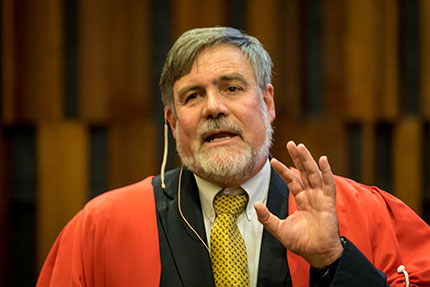BAM! And Bob's your uncle
- Wits University
A series of BANGs led Distinguished Professor Bob Scholes from wanting to be a game ranger, to being one of the top scientists in the world.
 When Distinguished Professor Bob Scholes looks back on his career, the analogy that he sees is exactly how complex systems like ecosystems work. Complex systems, like ecosystems, don’t change smoothly along a pre-destined trajectory. They change dramatically.
When Distinguished Professor Bob Scholes looks back on his career, the analogy that he sees is exactly how complex systems like ecosystems work. Complex systems, like ecosystems, don’t change smoothly along a pre-destined trajectory. They change dramatically.
“You’re coming along, minding your own business, then ‘BAM!’, something changes and you go in an all different direction. You never intended it. But it is a good direction. But then you’re just getting settled in that, and then ‘BAM!’, you’re hit by something else and you end of going somewhere else,” he says.
These changes are all very unpredictable and very contingent. So Bob’s advice to the younger generation of scientists would be to yes, by all means, have a plan, but be ready for whatever opportunities come to you, and follow your own instincts in making those choices.
“Start out by being born into the right family,” he says.
Bob’s mother, Mavis Scholes, was a schoolteacher and passionate about plants. His father was an engineer and an extremely rational man. He also was a mountaineer, so Bob grew up in the outdoors. His aunt was a science teacher and a botanist, so, from the start, it was almost obvious that Bob would end up as a biological scientist.
But that wasn’t a given at all. Bob had a very clear idea of what he wanted to do. He wanted to somehow be part of solving these massive environmental problems that were starting to pop up over the world in the late 60s and 70s.
However, he had something much more activist in mind. But when he tried to explain that to his school teachers, they thought his ideas were crazy but thought he was talking about “something like a game ranger”.
So in 1975, Bob came to varsity to study to be a game ranger.
However, early in his undergraduate, he worked for a very famous atmospheric physicist. And that was where his first “BAM!” moment came.
“She said to me, ‘Why don’t you become a scientist?’ and I just about fell about laughing,” said Scholes. “I said ‘I can’t possibly be a scientist. Those are clever people!” But she responded saying she thought Bob was “clever enough”.
It took another series of BANGs that took Bob through his career of being an ordinary scientist, through to being a systems ecologist and eventually ending up as an A-Rated scientist, being one of the leading one percent of scientists in his field in the world, and representing South Africa in a range of international environmental assessment bodies, including the Intergovernmental Panel on Climate Change.
“(One of these assessment panels) The Millennium Ecosystem Assessment has changed the language that we speak about the conservation of nature from being something that is an ethical and aesthetic concern, to a realisation that if we don’t preserve nature, we’re toast! We depend on nature, we require things from nature,” he says.
Bob brought back his experience gained on major assessments to South Africa, and applied his knowledge on issues like the management of elephants and the Karoo fracking issue. But he believes this approach could work in a number of other areas, one of them being the HIV/Aids crisis.
“Instead of fighting over it for five years, while a million people die, if we had an assessment, early on in that process, we may have come to a sensible decision a lot earlier,” says Bob.
As a systems ecologist, Bob currently looks at the world on a global scale, trying to find answers for one of the world’s most pressing problems, which is climate change. He believes we are currently experiencing the “sixth extinction crisis”.
“The Earth has had five big events that led to the mass extinction of species. In the last time, it was an asteroid that killed all the dinosaurs. This time, it is not an asteroid (that is responsible for a mass extinction), it is us.”
Like the constantly changing complex systems that he is studying, Bob’s career has also changed from being a clear scientist, to moving into the world of making or influencing policy.
“It is not enough to simply have the data, and have the evidence,” he says. “We, as scientists often think that we can just hold up the data and the world will say ‘ja, of course, let’s go and do that’”.
But it doesn’t work that way. “You have to move that evidence into a decision-making process and that is a really, really hard thing to do effectively.”

